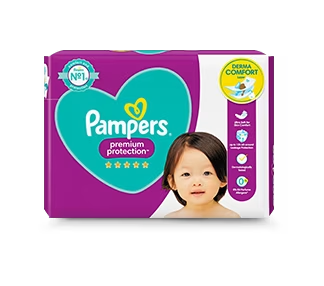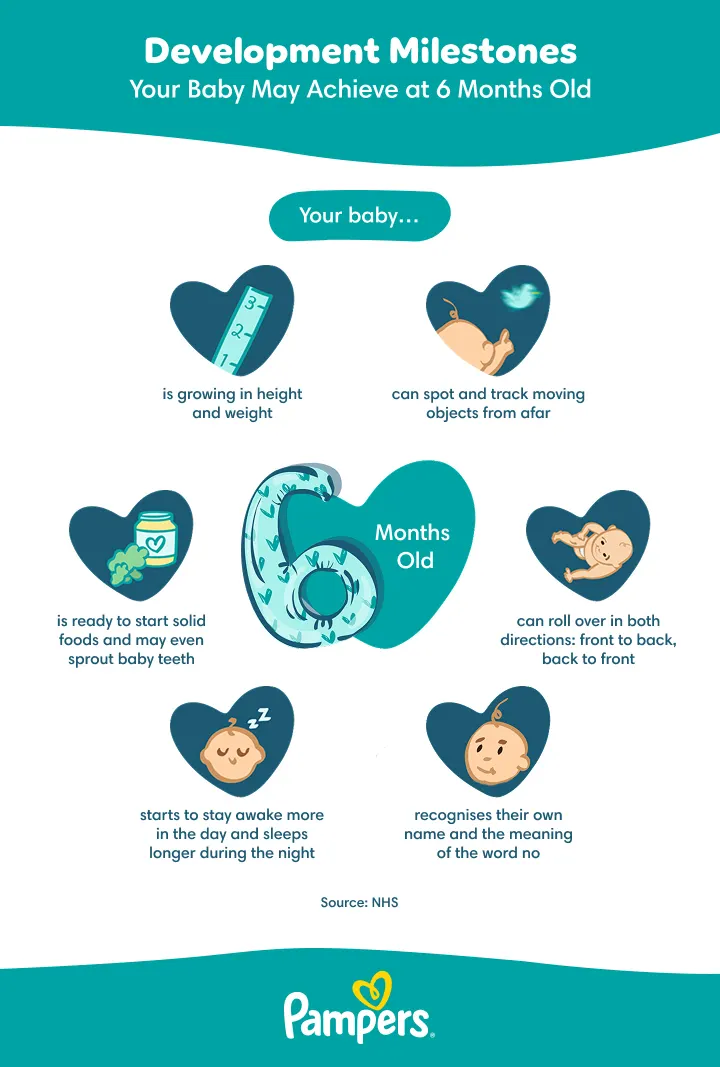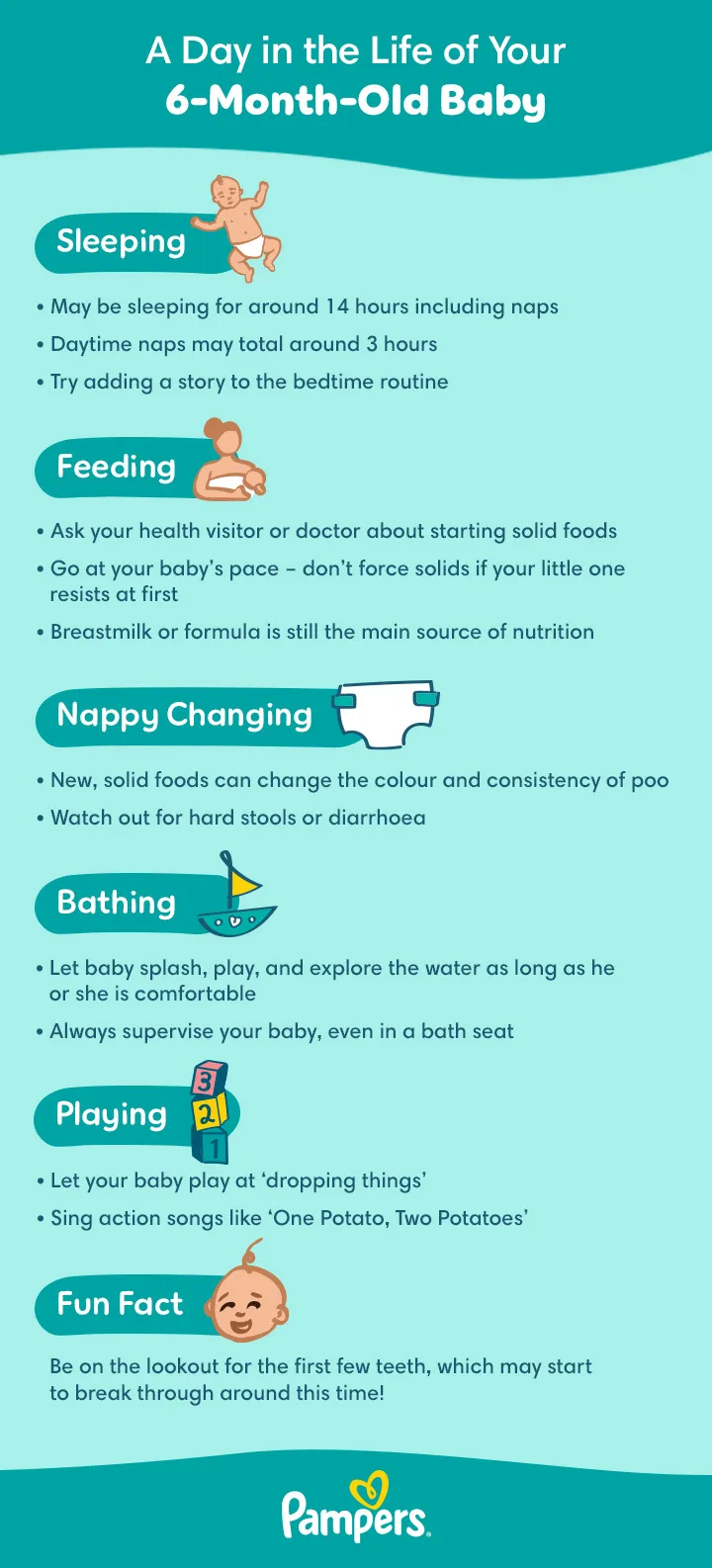Your 6-Month-Old Baby's Development and Milestones
At six months old, your baby is becoming more active, sociable and curious, making this an exciting stage of development for you both. From early physical milestones to developing communication skills, many six-month-olds can sit with a little support, babble more clearly, and respond with joy to familiar faces and voices.
Here are some typical six-month baby milestones:
Physical. Rolls over in both directions, can sit up with support, and may push up on their hands and knees.
Cognitive. Explores by mouthing toys, responds to sounds, and shows interest in new textures or mirror reflections.
Social/Emotional. Recognises caregivers, expresses happiness or frustration more clearly, and engages during play.
Communication. Babbling becomes more complex (with vowel-consonant sounds), responds to name, and cries with meaning.
Keeping track of your baby’s six-month milestones can boost your confidence in how they’re getting on. Below, we’ll take a look at each area of development and share practical tips to help your little one thrive, from feeding and sleep to play and health.
Baby Development Milestones
Over the past few months, your baby has gained new skills and abilities. For instance, your little one may now be able to spot objects that are several feet away and track moving objects with their eyes pretty well. You may notice those little ears pricking up at the sound of their name, or your baby might stop doing something when you say a firm ’no’.
Around the time your baby is six months old, pay extra attention so they don't roll off the bed or changing table after suddenly mastering the art of rolling over on both sides.
Physical Growth: Average Weight and Length of a Six-Month-Old
'How quickly they grow'! You may hear that sentiment echoed quite often. During the first 6 months, your baby will likely gain weight rapidly. Not all babies grow at the same pace, but don’t be surprised if your baby gains a lot of weight by this point, before gradually slowing as they become more active.
Rather than focusing on exact numbers, your baby's GP or health visitor use weight and length percentile charts to track steady growth over time. You can also monitor your little one’s progress using our baby growth chart, a helpful tool to see how your baby’s development compares with general growth trends.
Between now and 12 months of age, your baby's growth will be measured every 2 months. If you have any concerns, it's always best to contact your little one's GP or health visitor.
Curious how your baby’s growth compares?
Use our Baby Growth Chart Calculator to track weight, height and head circumference percentiles over time and get a clearer picture of your little one’s development.
Movement: Gross and Fine Motor Skills in Six-Month-Olds Develop
Your little one is getting stronger and more mobile by the day. Around the time your baby is six months old, they may be able to roll over in both directions. It’s better not to be caught unaware by these new skills when you’re least expecting it, so keep a very watchful eye – or even better, a hand – on your little one at all times, to make sure they don't roll off the bed, couch or changing table.
Each movement prepares your baby for the next step. As the trunk and neck get stronger, they may even be able to sit with support when placed in a seated position. Eventually, your little one will get more confident and be able to stay seated without any help.
You may also begin to see progress in fine motor skills for a six-month-old, like transferring objects between hands, reaching more precisely or exploring toys with their fingers.
Cognitive Development in a Six-Month-Old
At this stage, your baby’s brain is developing rapidly, and you can see the signs in the way they behave. A six-month-old’s development typically shows sharper perception, growing curiosity and a greater awareness of their surroundings.
At six months, your baby is seeing the world with new depth. Their field of vision is broader, and distances are easier to judge. They can spot items a few feet away and keep their gaze on them without squinting or crossing their eyes. They're also beginning to notice more colours and to track movement with improved accuracy.
Watch as your baby tracks your face with a curious gaze, then responds when you call their name, and turns toward the sounds nearby. These are clear indicators that their cognitive and sensory development is progressing as it should.
Behavioural Changes in a Six-Month-Old
Your baby is turning into a little communicator after spending the first few months listening to your voice and noticing the sounds you make. Your little one may start to imitate the sounds of speech around the age of six months. Your baby may perk up and take notice when called by their name. It’s going to be a thrill to observe how those language skills develop over the coming months!
As your little one becomes more mobile and curious, they may also become a little feistier. At this age, discipline is about keeping your baby safe. Setting boundaries helps teach your little one what acceptable and unacceptable behaviour is. The best way to handle an overly assertive 6-month-old is not to punish them, but to reward desired behaviour. If you notice your baby doing something that’s not allowed, stop them, make it clear that it’s wrong and get your little one interested in a better activity instead.
It’s also common to notice early signs of separation anxiety around six months old. Your baby may cry when you leave the room, cling to you more than before, or become wary of unfamiliar people. This behaviour is a normal stage in your baby’s emotional development, reflecting their growing realisation that you continue to exist even when out of sight.
Activities & Developmental Tips for Supporting Your Six-Month-Old
Six months brings a new level of interaction: your baby may sit with a little support, reach for toys and explore the world around them. This is a wonderful, hands-on phase for bonding and play, and a great chance to nurture your baby's development through everyday moments.
If you’re after ideas, try these easy, fun activities designed to spark your six-month-old’s development as they explore.
Read together daily. Reading aloud to your little one isn’t just a way of teaching new words; it also encourages your baby to listen, introduces new concepts and ideas, teaches them about the world and offers lessons in how to communicate. Reading to your baby can also help your little one grow socially and emotionally, especially if you tap your inner actor to read with emotions and sound effects. Your baby will want to look, point and touch the page as you read.
Talk and sing. Describe what you’re doing, name objects and respond when your baby babbles. This helps build early communication skills.
Encourage interaction. Your baby may want to touch, grab or mouth books and toys. Let them explore safely -- it supports learning through all their senses.
To build physical and emotional skills:
Play on the floor. Tummy time, rolling and supported sitting are great for strengthening core and neck muscles. You can get down on the floor with your baby to interact or provide toys for them to reach for.
Provide safe toys to grasp. Soft rattles, textured blocks and teething rings are great for little hands.
Keep routines consistent. Familiar activities, soothing voices and gentle caregiving help your baby feel secure.
Stay in tune with their mood. Whether they’re playful or tired, follow their cues. Your attention and responsiveness help them feel understood.
Wondering about other things to do with a six-month-old? Sometimes, it’s the simple moments, like snuggling during storytime, swaying to music or making silly faces, that support the biggest leaps in learning and bonding.
What 'Should' a Six-Month-Old Be Doing?
Now your baby is six months old, daily life is settling into a steadier rhythm, and you may start to wonder what a typical six-month-old can do at this stage. Whether routines are already in place or you’re simply planning ahead, this phase brings fresh discoveries and exciting developments to look forward to.
Although each baby is unique, here is an example of a daily schedule you could choose to follow when it comes to your baby’s eating, sleeping, bathing and playing routine.
Next up, we’ll explore each of these parts of your baby’s day in more detail, covering everything from meals to milestones, to help you feel confident as you support their growth.
Starting Solid Foods: What Can You Feed a Six-Month-Old?
This month, you may be wondering, 'What can I feed my six-month-old baby'? Welcome to the messy, exciting world of solids! While breast milk or formula remains your baby’s main source of nutrition, many babies are ready to try small tastes of real food now, too. It’s a milestone that’s both fun and important for growth.
Here are five simple steps to help you begin introducing six-month-old baby food:
Choose a time when your baby is alert and slightly hungry
Seat them upright in your lap or a high chair
Use a small spoon with a soft tip
Let them smell and taste the food slowly
Don’t worry if they push the food out or make a mess; it’s all part of learning.
It might be a good idea to start with some savoury food mashed with a fork, such as cooked vegetables or baby rice mixed with breast milk. Only give your baby one new food at a time and wait a few days before adding something new to the menu. Get more tips on how to start solid foods one at a time.
Keep an eye out for rashes, diarrhoea, or vomiting, as these may be signs of a food allergy. This is especially the case if a parent or sibling has a food allergy or another allergic condition such as asthma.
You can also try what is called baby-led weaning, which involves letting your baby sit with you and your family at mealtimes and eat independently using their fingers. If you’re giving this a go, make sure your baby sits in an upright position and only give them soft, easy-to-swallow food. Remove any hard skin, pips or stones and cut food into small squares or slices to prevent choking. You don’t need to buy special foods or cook separately for your baby – use the same food you make for your family, just leave out the sugar and salt. Salt is bad for little kidneys and sugar for tiny teeth.
Once your baby’s accustomed to the taste of vegetables, increase the range of flavours by adding mashed fruits, egg, meat, beans, plain cereals and plain yoghurt.
Some foods should be avoided until your baby is one year old. These include honey, salty foods, whole nuts, fish, caffeine, low-fat dairy products and anything with artificial sweeteners.
It’s important to keep in mind that even if your little one is getting a more varied diet with solids, breast milk or formula will still be needed until they're about 12 months old. As your baby eats more solid foods, he or she will gradually drink less milk.
Six-Month-Old Feeding Schedule
At this stage, your little one’s feeding routine is likely evolving, and you may be thinking about what a balanced six-month-old feeding schedule might look like. While each baby is unique, many are now ready for a mix of milk feeds and early solid foods.
So, how much baby food for a six-month-old? Your baby still needs plenty of breast milk or formula, typically about four to five daily feeds, with around 840-960 ml of formula per day or breastfeeding on demand.
Additionally, many parents introduce small servings of solids once or twice a day. This can include two to four tablespoons of iron-fortified infant cereal, two to three tablespoons of pureed fruits or vegetables, and soft proteins like one to two tablespoons of mashed beans or cooked meats.
Take a look at the baby feeding chart below for a quick visual overview of how feeding patterns typically change from birth through 12 months. It can help you understand where your six-month-old might be, and what’s coming next!
Teething at Six Months Old
At this time, six-month-old teething is common, though every baby’s timeline is different. Some may already have a tooth or two coming in, while others might still be a few weeks or months away. Signs of teething can include extra drooling, fussiness and chewing on objects.
As teeth start to appear, early oral care is important. Brush those first tiny teeth gently with a soft, child-size toothbrush and a tiny bit of fluoride toothpaste.
Because babies tend to explore the world by mouthing objects, especially when teething, keep choking hazards out of reach. Make sure toys and items they chew on are clean, safe and size-appropriate.
Nappies
Starting solids around six months can bring noticeable changes to your baby’s nappy contents. Stools may become firmer, smellier and darker in colour, and it’s common to see undigested bits of food, like vegetables, in the nappies. Even cooked veggies can be tough for young digestive systems to fully break down.
It’s also possible for your baby to experience constipation or diarrhoea as they try new foods. Iron-fortified options like rice cereal or formula may sometimes cause constipation.
To help ease digestion, continue offering breast milk or formula before solids. This ensures your little one gets the most nutritious food first and helps prevent overfilling on harder-to-digest items. You can also start introducing other drinks, preferably sticking to clear fluids such as water.
As always, if you’re concerned about changes in your baby’s bowel movements or see signs of discomfort, consult your baby’s GP or health visitor.
As nappy needs evolve, a soft, absorbent nappy can make all the difference. Pampers Premium Protection Taped are designed to stay snug and help protect against leaks while keeping your baby dry and comfortable throughout those busy, active days.
How Much Sleep Does a Six-Month-Old Baby Need?
At six months old, your baby might snooze around nine to eleven hours at night, sometimes even longer, with maybe a few brief awakenings. Around this stage, they may no longer need a night-time feed. During the day, your little one still needs about three hours of nap time.
It’s common to notice a six-month sleep regression, a brief phase when your baby’s sleep suddenly becomes more disrupted. Sleep regressions may happen at various stages during the first year and are often linked to developmental leaps or becoming more aware of their environment. If you’ve already experienced the 4-month sleep regression, this might feel familiar.
During a developmental regression, your baby may wake more often, resist naps, or struggle to settle at night. Sticking to a reliable routine can help, and if you’re considering it, sleep training for a six-month-old is often more straightforward now that their sleep patterns are more settled.
If your baby’s sleep feels off track, the Smart Sleep Coach app offers personalised guidance. Co-created by paediatricians, it includes a sleep tracker, tailored tips, and gentle coaching tools to support your baby’s sleep development.
Your Baby’s Health
As your baby gets more mobile and reaches out to grab things, your little one has a higher risk of catching an infection. Your best bet is to keep your baby away from anyone with the flu or any other infectious disease. Sometimes, though, it’s impossible to prevent your little one from getting sick.
Some infections you may want to watch out for in your 6-month-old:
Diarrhoea. Loose stools can be caused by viruses, food sensitivities, or the introduction of juice or new foods.
Fever. A fever is often a sign that your baby’s immune system is fighting off an infection.
Ear infections. These are especially common between six months and three years old and often follow colds.
Chickenpox. Chickenpox is a mild illness that can typically only be caught once and gets better on its own. In addition to itchy spots, signs also include flu-like symptoms such as fever or feeling generally unwell. Chickenpox is contagious from two days before the rash appears until the blisters have crusted over. Though there’s no treatment, you can get cooling creams or gels from the pharmacy to relieve your baby’s itchy skin.
If your baby shows signs of illness, like a high fever, discomfort or a change in feeding or sleep patterns, consult their GP or health visitor.
Six-Month-Old Milestones Checklist
Every baby grows at their own pace, and that’s perfectly normal. Around six months, parents often recognise typical milestones; you can use this handy checklist to celebrate progress and identify areas where a little extra encouragement might help.
Rolls over in both directions
Sits upright with little or no support
Pushes up on arms and reaches confidently for toys
Uses hands and mouth to explore objects
Responds to their name and may pause when hearing 'no'
Babbles with vowel-consonant sounds like 'ba' or 'da'
Shows deeper curiosity, studies faces, sounds and surroundings
May show early signs of separation anxiety
Begins to try solid foods alongside breast milk or formula
Sleeps around 12 to 16 hours in 24 hours, including two to three naps.
If you’re unsure about your little one’s development or you have concerns, talk with your baby’s GP or health visitor. They can offer insight, reassurance and support tailored to your little one.
To Do’s and Items You’ll Need This Month
At six months, your baby is likely to be more active, curious and keen to explore their world. To guide you through this phase, use this practical monthly checklist covering development, health and safety.
Take a fresh look at babyproofing. Now’s a good time to reassess your space as your baby starts rolling, sitting, or preparing to crawl. Use this babyproofing guide to help you identify and prevent common household hazards.
Tuck away cords and charging cables
Secure furniture and fittings that they might pull on
Cover sharp edges on furniture
Install baby gates if needed.
Get ready for your little one's six-month checkup. Make a list of any questions you have about feeding, sleeping, development or vaccines.
Celebrate your baby’s half-birthday with a photo and share with friends and family.
Looking ahead? Here’s a preview of what to expect next month.
Stock up on items you’ll need this month. A highchair for solid food feedings, textured or musical toys to support play, a humidifier for dry air, a baby thermometer for temperature checks, nappies, wipes, nappy rash cream and childproofing basics like outlet covers and furniture straps.
FAQs AT A GLANCE
Six-month-olds are usually curious and sociable, thriving on interaction and play. With support, they may sit up, babble, respond to their name, reach for objects, and start on solid foods, all as they explore the world with growing mobility and awareness.
Checklist for This Month
Babyproof your home. To get started, read up on all the ways you can babyproof your home.
Each month brings more exciting changes for your little one. Find out what could be waiting for you when your baby turns 7 months old.
For even more information, sign up to get our emails:
6 month old baby - checklist
Bottom Line
6 months is a big milestone for both you and your baby. They’re learning, growing and becoming more aware of the world around them, while you’re finding your rhythm as a parent. Whether it's trying solids, sleeping longer or babbling back at you, every moment is a sign of their progress and your care.
To support you along the way, the Pampers Rewards App offers digital offers on nappies and wipes. It’s a simple way to save as you continue showing up for your little one every day.







